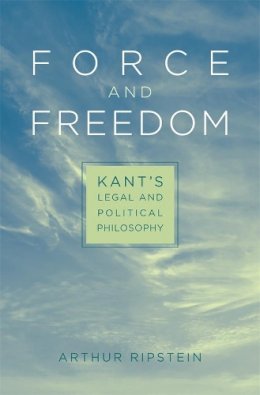
Force and Freedom: Kant’s Legal and Political Philosophy
Arthur Ripstein
In this masterful work, both an illumination of Kant’s thought and an important contribution to contemporary legal and political theory, Arthur Ripstein gives a comprehensive yet accessible account of Kant’s political philosophy. Ripstein shows that Kant’s thought is organized around two central claims: first, that legal institutions are not simply responses to human limitations or circumstances; indeed the requirements of justice can be articulated without recourse to views about human inclinations and vulnerabilities. Second, Kant argues for a distinctive moral principle, which restricts the legitimate use of force to the creation of a system of equal freedom. Ripstein’s description of the unity and philosophical plausibility of this dimension of Kant’s thought will be a revelation to political and legal scholars.
In addition to providing a clear and coherent statement of the most misunderstood of Kant’s ideas, Ripstein also shows that Kant’s views remain conceptually powerful and morally appealing today. Ripstein defends the idea of equal freedom by examining several substantive areas of law—private rights, constitutional law, police powers, and punishment—and by demonstrating the compelling advantages of the Kantian framework over competing approaches.
Product Details
About Arthur Ripstein
Reviews for Force and Freedom: Kant’s Legal and Political Philosophy
Allen Wood
Notre Dame Philosophical Reviews
There can be little doubt that this is the book against which all other interpretations of Kant’s legal and political theory will be measured.
Andrew Botterell
Canadian Journal of Political Science
Force and Freedom is arguably the best book ever written on Kant’s legal and political philosophy.
Jon Mandle
Dialogue
A prominent feature of the landscape in moral philosophy and its history during the past forty years has been the simultaneous flowering of scholarship on Kant, alongside Kantian approaches to contemporary ethical theory. Kant’s legal and political philosophies have fared less well, however. With some notable exceptions, they have attracted less sustained scholarly interest and inspired nothing like the contributions to current debates of Kantian moral philosophers such as Herman, Hill, and Korsgaard. Arthur Ripstein’s Force and Freedom goes a long way to redressing this imbalance. It provides both a beautifully clear and insightful interpretation of the relevant Kantian texts as well as a sympathetic and forceful presentation of their central claims and arguments as Ripstein interprets them. It is a remarkable achievement.
Stephen Darwall
Legal Theory
This is one of the best books on Kant’s legal philosophy to appear to date. It is both an outstanding commentary on Kant and an important work of legal-political philosophy with much contemporary relevance. What is perhaps most impressive about this book is how much unity it uncovers in Kant’s legal and political thought.
Martin J. Stone, Benjamin N. Cardozo School of Law This masterful treatment of Kant’s legal and political philosophy gets to the heart of Kant’s endeavor and its virtues with wonderful clarity—a terrific achievement. We learn from Ripstein both how Kant’s legal and political philosophy is best understood and how this philosophy can be defended and employed in ongoing philosophical debates. I regard this as the very best kind of approach to the history of philosophy.
A. John Simmons, University of Virginia
